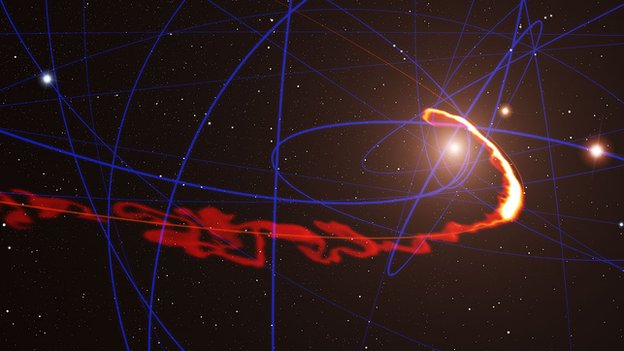It looks like you're using an Ad Blocker.
Please white-list or disable AboveTopSecret.com in your ad-blocking tool.
Thank you.
Some features of ATS will be disabled while you continue to use an ad-blocker.
4
share:
Astronomers will for the first time get to watch as the super massive Black Hole at the center of our Galaxy chows down on a gas cloud being attracted
toward it .
The event is expected to happen at the end of 2013 .
According to Mark Morris of the University of California Los Angeles "many telescopes are likely to be watching" , does this mean we will get decent pictures of this from Hubble
The event is expected to happen at the end of 2013 .
Though it is known that black holes draw in everything nearby, it will be the first chance to see one consume such a cloud.
As it is torn apart, the turbulent area around the black hole will become unusually bright, giving astronomers a chance to learn more about it.
Researchers using the European Southern Observatory's Very Large Telescope estimate that despite its size, the cloud has a total mass of only about three times that of Earth.
They have plotted the cloud's squashed, oval-shaped path and estimate it has doubled its speed in the last seven years - to 2,350km per second.
www.bbc.co.uk...
According to Mark Morris of the University of California Los Angeles "many telescopes are likely to be watching" , does this mean we will get decent pictures of this from Hubble
edit on 14-12-2011 by gortex because: Edit to add
I hope they get some awesome pictures out of this. I don't think they'll be recording it in the visible spectrum though. I wonder how they detect
the gas cloud if they have to observe with wavelengths of light that pass through the gas clouds around the center of the galaxy?
The event is upon us ...or it .
The gas cloud is being stretched out by the gravity of our galaxy's central black hole.

I watched an edition of Horizon about this a few weeks ago , I found it a very interesting program so here it is for anyone interested
The gas cloud is being stretched out by the gravity of our galaxy's central black hole.

"The most exciting thing we now see in the new observations is the head of the cloud coming back towards us at more than 10 million km/h along the orbit - about 1% of the speed of light," said Reinhard Genzel, from the Max Planck Institute for Extraterrestrial Physics in Germany. "This means that the front end of the cloud has already made its closest approach to the black hole."
www.bbc.co.uk...
I watched an edition of Horizon about this a few weeks ago , I found it a very interesting program so here it is for anyone interested
For cosmic detectives across the Earth, it is a unique opportunity.
For the first time in the history of science, they hope to observe in action the awesome spectacle of a feeding supermassive black hole.
edit on 17-7-2013 by gortex because: (no reason given)
new topics
-
Hurt my hip; should I go see a Doctor
General Chit Chat: 11 minutes ago -
Israel attacking Iran again.
Middle East Issues: 1 hours ago -
Michigan school district cancels lesson on gender identity and pronouns after backlash
Education and Media: 1 hours ago -
When an Angel gets his or her wings
Religion, Faith, And Theology: 2 hours ago -
Comparing the theology of Paul and Hebrews
Religion, Faith, And Theology: 3 hours ago -
Pentagon acknowledges secret UFO project, the Kona Blue program | Vargas Reports
Aliens and UFOs: 4 hours ago -
Boston Dynamics say Farewell to Atlas
Science & Technology: 4 hours ago -
I hate dreaming
Rant: 4 hours ago -
Man sets himself on fire outside Donald Trump trial
Mainstream News: 6 hours ago -
Biden says little kids flip him the bird all the time.
Politicians & People: 6 hours ago
4
